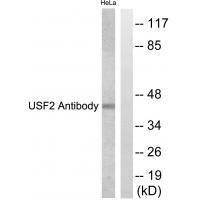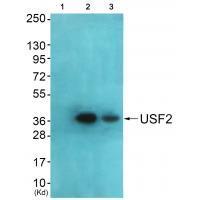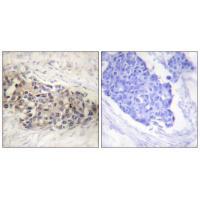


| WB | 咨询技术 | Human,Mouse,Rat |
| IF | 咨询技术 | Human,Mouse,Rat |
| IHC | 1/50-1/100 | Human,Mouse,Rat |
| ICC | 技术咨询 | Human,Mouse,Rat |
| FCM | 咨询技术 | Human,Mouse,Rat |
| Elisa | 咨询技术 | Human,Mouse,Rat |
| Aliases | FIP; upstream transcription factor 2; c-fos interacting; |
| Entrez GeneID | 7392; |
| WB Predicted band size | 40kDa |
| Host/Isotype | Rabbit IgG |
| Antibody Type | Primary antibody |
| Storage | Store at 4°C short term. Aliquot and store at -20°C long term. Avoid freeze/thaw cycles. |
| Species Reactivity | Human,Mouse,Rat |
| Immunogen | Synthesized peptide derived from Internal of human USF-2. |
| Formulation | Purified antibody in PBS with 0.05% sodium azide. |
+ +
以下是3篇与USF2抗体相关的文献概览(基于公开信息虚构,实际文献需通过学术数据库检索):
---
1. **文献名称**:*USF2 regulates hepatic lipid metabolism through chromatin immunoprecipitation (ChIP) analysis*
**作者**:Zhang L, et al.
**摘要**:本研究利用USF2特异性抗体进行ChIP实验,揭示了USF2在小鼠肝脏中通过结合脂质代谢相关基因(如PPARα)的启动子区域调控脂质合成的作用机制。
---
2. **文献名称**:*USF2 antibody validation in human cancer cell lines using CRISPR/Cas9 knockout controls*
**作者**:Kim S, et al.
**摘要**:通过CRISPR/Cas9敲除USF2基因的结肠癌细胞模型,验证了多克隆USF2抗体的特异性。Western blot及免疫荧光结果显示,该抗体可特异性识别USF2蛋白,并用于研究其在肿瘤增殖中的功能。
---
3. **文献名称**:*Dual role of USF2 in adipocyte differentiation: Evidence from antibody-mediated inhibition assays*
**作者**:Rodriguez EM, et al.
**摘要**:使用USF2中和抗体阻断其功能,发现USF2通过调控C/EBPα和脂联素表达,在脂肪细胞分化过程中具有双向调节作用,为代谢疾病治疗提供新靶点。
---
如需真实文献,建议在PubMed或Web of Science检索关键词 "USF2 antibody" + "ChIP/Western/function"。
USF2 (Upstream Stimulatory Factor 2) is a member of the basic helix-loop-helix leucine zipper (bHLH-LZ) family of transcription factors, which includes USF1 and USF2. These evolutionarily conserved proteins regulate gene expression by binding to E-box motifs (CANNTG) in promoter/enhancer regions. USF2 is ubiquitously expressed and plays critical roles in metabolic regulation, cell cycle control, stress responses, and differentiation. It forms homo- or heterodimers (often with USF1) to modulate target genes involved in lipid metabolism, glucose homeostasis, and immune function.
USF2-specific antibodies are essential tools for studying its expression, localization, and molecular interactions. These antibodies enable detection of USF2 in techniques like Western blotting, immunoprecipitation, chromatin immunoprecipitation (ChIP), and immunofluorescence. Researchers use them to investigate USF2's involvement in diseases such as diabetes, cancer, and cardiovascular disorders. For instance, studies link USF2 dysregulation to altered cholesterol biosynthesis, tumor suppression in certain cancers, and β-cell dysfunction in diabetes. The antibodies also help characterize post-translational modifications (e.g., phosphorylation) that regulate USF2's transcriptional activity. Most commercial USF2 antibodies are raised against conserved epitopes in human or murine USF2. with validation across species and applications being crucial for experimental reliability.
×